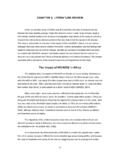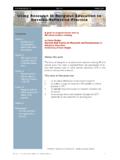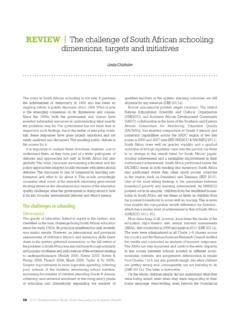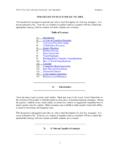Transcription of Teaching about HIV/AIDS - Learning Development …
1 Teaching about HIV in Mozambique Issue Paper Page 1 Teaching about HIV/AIDS Do teachers talk about HIV/AIDS ? Do teachers in Mozambique really talk about HIV/AIDS ? Well, there may not be a single, sim-ple answer to this question. When we first started asking around, some of the people we ap-proached quite firmly stated that teachers are not good communicators about this sensitive topic: they are not knowledgeable enough and sometimes they don t set a good example be-cause of their personal behavior. Other respon-dents were more moderate in their replies, affirm-ing that broaching the subject of aids /HIV de-pends on the teacher and his/her understanding of the disease, training, and personal experience. And then, to make things just a little more compli-cated, there were even those who replied with a simple and straightforward yes of course, how could you doubt it.
2 Faced with such diversity we decided the best tac-tic was to turn to the source and ask the teachers! And, because the question was obviously a com-plex one, we decided to go beyond our initial con-cern, and to ask teachers to talk at length about their experience and knowledge of HIV/AIDS , about the reality of this disease in their schools and communities, about their fears and hopes, and about what they think the future will bring to their schools and to their lives. This paper discusses the key findings of this study, based on interviews and discussions with over 600 primary and secondary school teachers in southern Mozambique (Gaza Province). We will focus specifically on those findings related to Teaching about HIV/AIDS in schools. Thus, we will look at: Are teachers talking about HIV/AIDS ? In what way do teachers talk about HIV/AIDS ?
3 What factors influence teachers intention and approach to talking about HIV/AIDS ? These questions are important because teachers in Mozambique are expected to play a key role in fighting HIV/AIDS . But in order to do so, we need to know what is happening in the classroom, in schools and in communities, and we need to fo-cus on ways in which teachers can play a more effective role. As you read what follows you may find it useful to make a mental note of your own experience/ideas and to compare and contrast these with the find-ings. Also, to help you think about key issues, we have placed strategic questions in the text for you to think about and to discuss with your col-leagues. We suggest you use these questions as building blocks for your own thinking and for the group discussion. Teachers in a lively debate during a focus group discussion in Bilene Teaching about HIV in Mozambique Issue Paper Page 2 What is happening in the schools?
4 The purpose of this study was to give teachers a voice, to let them do the talking about HIV/AIDS . So, we will start with the words of Martha, a teacher in a rural school in Gaza The story of Martha tells us many things about the difficulties of addressing HIV/AIDS , some of which we will return to later. For Martha, HIV/AIDS is a reality which she is determined to address. How-ever, is Martha s situation the norm or the excep-tion? Is HIV/AIDS an issue for teachers in the classroom? Are they talking about it? Let s have a look at what the research showed us. We first asked the teachers whether, when and where they were talking about HIV/AIDS . And then we asked students whether teachers were talking to them about HIV/AIDS . We will look at the answers of the teachers first. According to the The simple answer is that yes, many, but cer-tainly not all teachers say they do talk about HIV/AIDS .
5 In our group of 606 respondents, just under 60% of the teachers said they had talked about HIV/AIDS with their students in the past month. However, only one in every three of those teachers (in other words 20% of all the teachers who participated in the study) reported broaching the subject during class. The remaining teachers said they talked about HIV/AIDS on other, more informal, occasions, such as during conversations with students at school, during casual meetings in the community, and in the context of so-cial/cultural events outside of school. Graph1: Talked about HIV in the past month Go away! Teachers are not For the people in my community things are very clear, it is not the teachers who should talk about this. They have not been recommended to do so. When I try to talk about this disease the people in my area don t take to it kindly, they even comment: Since when did this teacher learn these things, she should be Teaching , when did she ever take a health course.
6 Are the doctors going to sell us vegetables next, and will the bricklayer be Teaching our children how to read and write? So it is clear to me, when the teacher is alone, no one will take them seriously . Difficulties that teachers face in talking about HIV/AIDS The following quotes give an idea of some of the things teachers said to us: We have tried to talk of this terrible disease with our pupils. But the problem is that we don t have ways of commu-nicating adequately with them, we don t have the right terminology. We cannot talk about sex with them, it is not our tradition. So we talk about things that can cut them, like razors. But there is a monotony to what we are able to talk about . We are not able to talk about everything 34 year old primary school teacher in rural Mandlakazi. Not all teachers can talk easily about these issues.
7 A teacher in a rural area will have much more difficulty when trying to talk to children between13-16 years old. People will say that that teachers is doing harm because he is introducing children to something they did not even know about and now they have become interested in it. Or they may even say that all he wants is to take advantage of his students female secondary school teacher in Xai-Xai. Teachers who talk about condoms are accused of trying to reduce the strengths of families and communities be-cause they will have fewer children young teacher in Bilene. Teaching about HIV in Mozambique Issue Paper Page 3 Question to you: This study shows only one in five teachers talk about HIV/AIDS in a classroom setting. Do you think this is a problem? Why or why not? From our study we also learnt that about 40% of the teachers do not talk about HIV/AIDS at all with their students.
8 And even those teachers who do talk about HIV/AIDS often find it difficult to do so. We will discuss some of the constraints to teachers talking about HIV/AIDS below. But first, let s examine what students had to say. According to the In general, students say that teachers are a valid source of information about HIV/AIDS . In fact, they rank teachers second (mentioned by 63% of the 234 students) after the radio (with 85%) as their most important source of information. Other important sources of information are newspapers (57%) and friends (50%). Graph2: Rating of different sources of information about HIV by students Religious leaders, traditional healers, and HIV/AIDS posters were ranked as least important (mentioned by 15% or less). However, the responses from students also con-firmed what teachers themselves were saying, namely that only relatively few teachers are talking about HIV/AIDS in the context of their disci-pline/classroom setting.
9 Furthermore, it was inter-esting to note that students whose teachers had not addressed the issue of HIV/AIDS at all were more likely to rate teachers as an important source of information than students whose teachers had talked about this issue. In other words, teachers have the potential to be a good source of informa-tion but in practice may not be providing students with the most effective messages. However, before we can draw conclusions about this, we need to have some idea of what teachers are talking about . How do teachers talk about HIV/AIDS ? Information provided by the students who partici-pated in the study indicates that those teachers who talk about HIV/AIDS address only certain aspects of the disease. As the figure below shows, teachers focus mainly on modes of transmission and on prevention.
10 In a nutshell this means that they are focusing on explaining how the disease is spread and what can be done to prevent it. Far less attention is paid to other key issues such as symptoms (27%), abstinence (10%), discrimination (14%) and the social factors such as poverty, myths and certain cultural prac-tices (13%) that contribute to the spread of the disease. Only one third of the teachers use ex-amples or provide practical exercises for students to engage in. A girl in a primary school in Ch kwe filling out a questionnaire Teaching about HIV in Mozambique Issue Paper Page 4 Many teachers reported wanting to talk about HIV/AIDS but finding it difficult to integrate the topic in their subject matter, lacking clear exam-ples, and feeling frustrated with repeating the same message over and over again.














